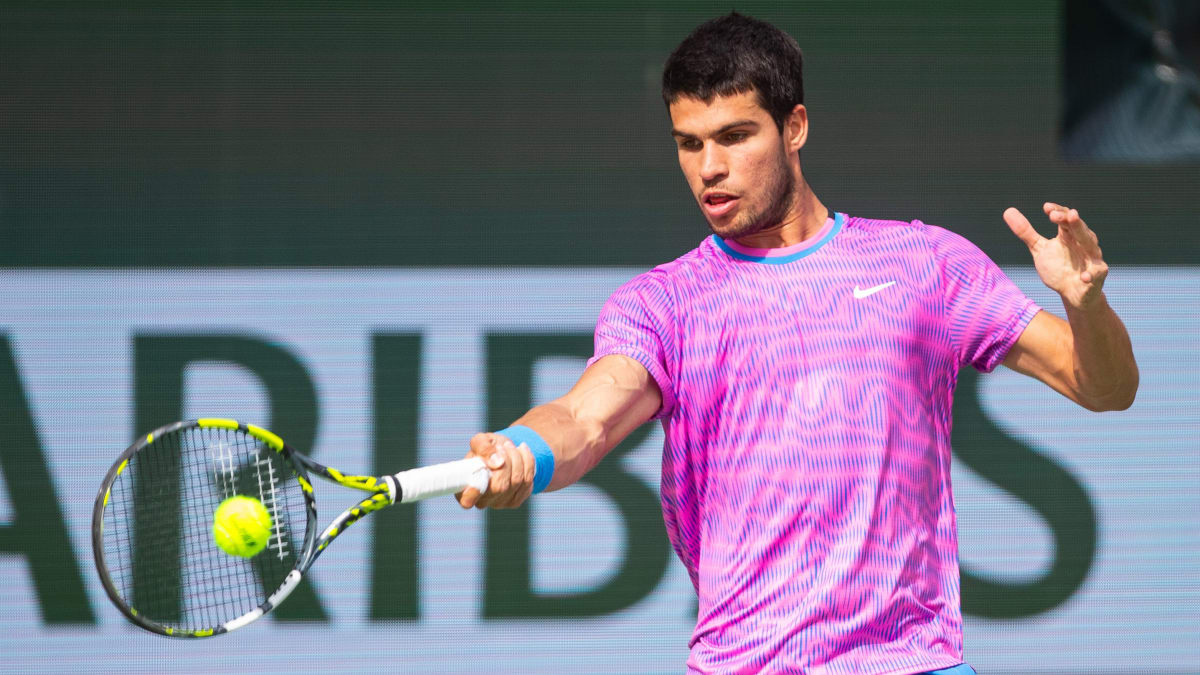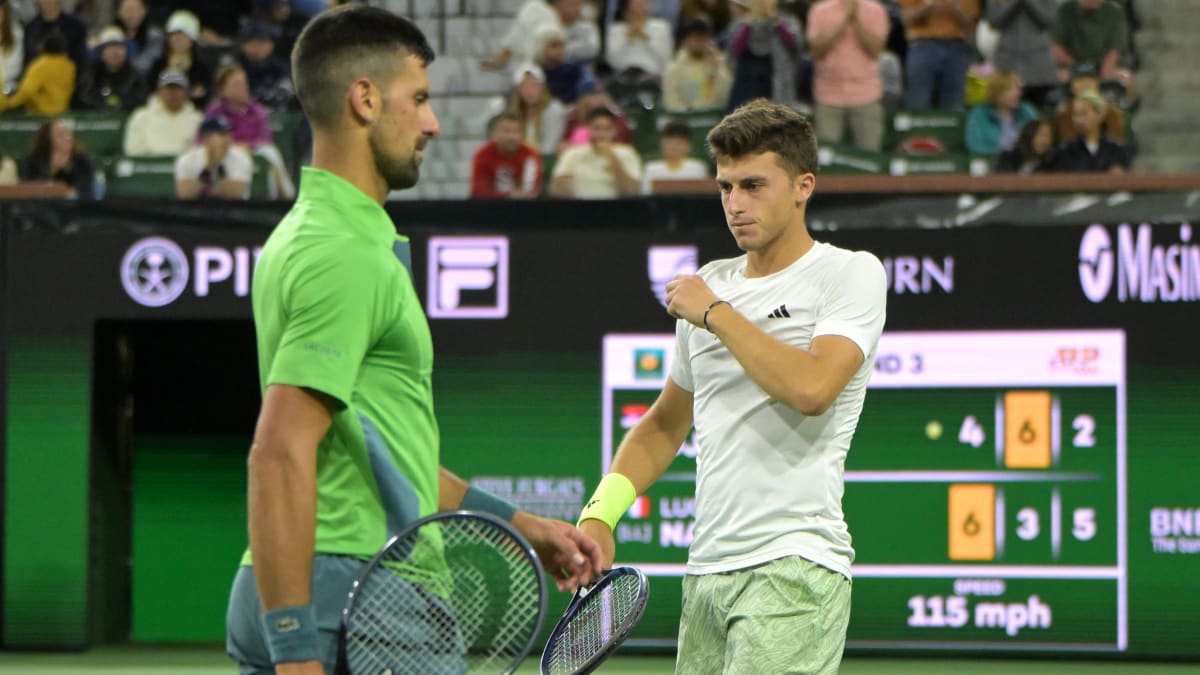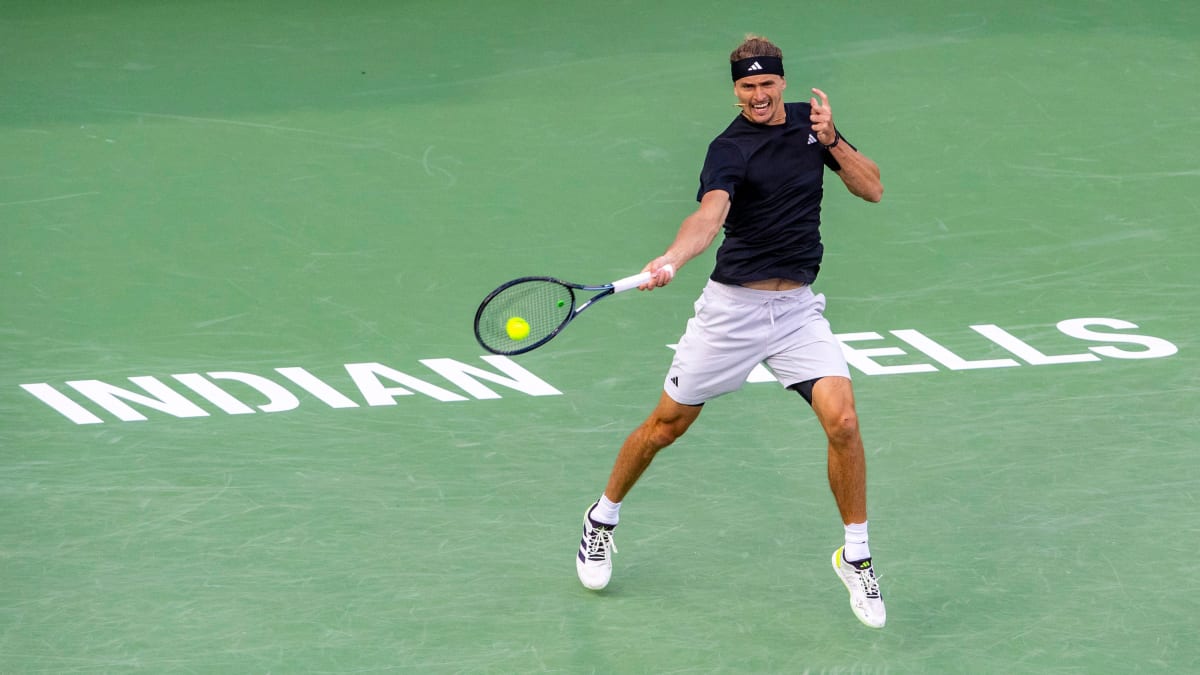Hey everyone:
• Here’s the latest Served podcast, wrapping up Indian Wells and featuring Miami tournament director James Blake.
• Colette Lewis has your Indian Wells juniors results.
• Five top-line observations from a smashing 2024 BNP Paribas Open in Indian Wells …
1) It’s hard to imagine a 20-year-old, two-time major winner in a “what-have-you-done-for-me-lately” mode. But that was Carlos Alcaraz entering Indian Wells. Last August, a month after his dramatic Wimbledon win, he was inches from beating Novak Djokovic in Cincinnati, which would have given him sole possession of the penthouse. Cue: a tennis sliding door. Alcaraz lost that match. And … before last week, he hadn’t so much as reached a final. Again, that was nearly seven months ago. Some of this is owed to injury. Some to bad luck (an injury that kept his coach off the road). In that time, Djokovic won another major. Jannik Sinner ascended and took a good deal of the shine. Alcaraz lost some fine matches to top-flight players; he also lost to players like Roman Safiullin. He rolled his ankle in Rio. It was easy to wonder what was going on inside the House of Alcaraz. And then he turned in his best week of tennis since last summer and beat all comers to defend his title in the desert. No matter how many data points exist, too often we (a) underestimate the resilience of champions, and (b) underestimate that careers are not linear and it’s entirely okay—normal, even—for stocks to dip and rise.

Brandon Magpantay/Special to The Desert Sun/USA TODAY NETWORK
2) The best player of this millennium? Serena Williams. Easy. After that? Probably Venus Williams. Maybe Justine Henin. But here comes Iga Świątek. In part because of her modest, self-effacing ways, she presents as something other than dominant. But the match doesn’t lie. Her Indian Wells hardware is her eighth 1000-level trophy. It's a nice accessory to the four majors she’s won. She has won 19 of 22 finals. And still has that mode where the player on the other side of the net is less an opponent than an unwilling partner in her showcase. (Sunday’s final, fittingly, featured a 6–0 final set.) Świątek may contest this. Or at least deflect the suggestion. But this is a player not just worthy of tennis’s Mt. Olympus cloud palace, but major god status.
3) How does tennis take its universally beloved players and turn them into stars? There is a long history of the NBA getting great mileage from those who might not make All-Star teams, but who connect with fans. There are popular UFC fighters who have never won belts. How does tennis do the same? I am thinking specifically of tennis treasure Hsieh Su-Wei, the 38-year-old Taiwanese—not Chinese, as is too often reported—singularity, who won the Indian Wells doubles title with Elise Mertens. Here is an ageless champion, with a sui generis game and personality. Su-Wei may not end up in the Hall of Fame. But as long as she’s still playing, she should be doing so before filled stands.
4) Another event, another close-but-not-quite outing for Daniil Medvedev. He was the U.S. Open runner-up, the Australian Open runner-up and now the Indian Wells runner-up (having also been the runner-up in 2023). That’s a lot of points and prize money; but also, a lot of consolation speeches. One potential cause: his temperamental serve. When Medvedev won the 2021 U.S. Open, he was broken six times, including only once in the final against Djokovic, as fine a returner as has ever played the sport. In Australia, Medvedev nearly won the tournament despite being broken 23 times. In Indian Wells, he was broken 19 times.
5) Everyone had a good laugh (and pun) over the bee invasion and bee remover, Lance Davis. And yes, it should be noted that it’s not even April and already tennis has featured on-court killer bees and poisonous snakes. But at some level, isn’t this what we love about sports? The utter unpredictability? You can perhaps surmise that, say, Shiv Roy will get shivved or that One Day won’t end tidily [spoiler edit]. But when a match gets interrupted by insects, and the hero gets his car out of the shop and arrives with a vacuum cleaner to save the day … it makes Emma Raducanu’s U.S. Open look prosaic and scripted.
Meanwhile, a few Q&As …
Losing to Sinner is one thing. Losing to Luca Nardi is another. Has Father Time caught up to Djoker?
PDX
• Read into it what you will. Even days after the fact, there were more questions about the Djokovic loss than the Alcaraz win. One side says, “He’s a 24-time major champ; he’s allowed a few dips.” The other side says, “Losing to an-informed Sinner is one thing. Losing to a player outside the top 100 is another. Something is up.” What’s additionally perplexing: There does not appear to be obvious physical issues or compromise. Which should be a source of optimism for Djokovic and his fans. But also makes this swoon and his explanation equally cryptic and hopeful.

Jayne Kamin-Oncea/USA TODAY Sports
This is informed speculation. Djokovic is having motivation issues. He has two children, who are growing up and notice his absence. He has a wife at home. He has a foundation. Work/life balance is a dance we all do, even superstar athletes. Thinking about his current woes, I was recalling my conversation with Djokovic late last year. I went back to the transcript and was struck by this:
Jon Wertheim: I'm also wondering if that doesn't make it harder to go on the road —to traipse off to Australia—when you have two kids in school …
Novak Djokovic: My heart rips apart every time I leave them. So I find it more and more challenging and more difficult to leave my kids and my family behind. They are not traveling as much with me, particularly when it’s not in Europe, when it’s not close by, because, of course, they have school, you know? My wife has work. And it’s not easy. They cannot always [adapt] and adjust to me. So when we are apart for, you know, three, four, five weeks, it’s a struggle. But, you know, there are families and people in the world that are, you know, experiencing far more bigger difficulties than us. So I try to always pinch myself and remind myself that, hey, we are healthy, and we love each other. We are great. It could be far, far worse … [But] It’s so hard for me to leave them. So I’m playing less because I want to spend more time with them. I’m picking and choosing which kind of tournaments I want to play and compete at. And I have to be more selective.
I’m curious, does Tennis Channel (or ESPN) screen the former players they hire as commentators before hiring them? Or provide them with any training prior to putting them on the air. Regardless of the sport, not all former players make great commentators or announcers. Some are naturals and great right out of the gate: Tony Romo in football; Johnny Weir and Tara Lipinski in figure skating; Chris Eubanks, Bethanie Mattek-Sands, Andy Roddick, and Lindsay Davenport in tennis (among others). Unfortunately, some are not so great right out of the gate or not very well received for any number of reasons. Perhaps they talk too much or too fast, or not enough about the match actually being played, or too much about their own glory days. It just seems like something other than an on-air trial by fire would be appreciated by the fans????
Lilas Pratt, Marietta, GA
• I speak only for Tennis Channel. But, yes, former players are screened—and often call matches on tape as both trial runs and training exercises. To name check, executive producer Ross Schneiderman is especially adept at putting former players in the best possible position to succeed.
You are correct that some former players make the transition more smoothly than others. Sometimes it’s easy to predict (did anyone not expect Eubanks or Andrea Petkovic to slay, as the kids say?) and sometimes there are surprises, both good and bad. Speaking from experience, often it’s just about reps. The more you work, the more you gain comfort and pick up hacks, dos and don'ts and an awareness of your crutches. You intuit when you are speaking too much or not enough; when it’s appropriate to jump in and when it’s not. I suspect it’s similar to how people entering any new workforce gain comfort and learn when and how long to speak in a meeting, or how to draft an appropriate memo.
If asked, one piece of advice I humbly give former players: Take the green room to the set. That is, speak on air the same way you would beforehand. Sometimes former players are brimming with energy and insight and nuggets when they are tying their tie or going over the rundown. Then, live on set, they suddenly become cautious or monotone or retreat to cliché.
I have also noticed that the best broadcasters take the best of tennis—an awareness of the world, observational powers, the ability to problem-solve, a social awareness, a sense of timing, a healthy relationship to competition—and use those same skills in a new context. Jim Courier, Davenport and Roddick are three prime examples.
The broadcasters who struggle often are the ones who bring to bear the worst of tennis: narcissism, defensiveness, hypercompetitiveness and unfamiliarity with a team setting. Unlike tennis, there are no objective, cold, empirical rankings. Subjectivity can be a challenge. There are former players who are fine on the air, but get work because they are pleasant, low-maintenance and work well with others. Others are technically superior and more wired in but struggle in a team environment.
Regarding [Alexander] Zverev, are you as surprised as I am how much support he still has from fans in general? I mean, what does a guy have to do these days to earn a little ill will from the public?
Jason, Austin, TX
• I think there are a few factors here. First, don’t underestimate ignorance. I suspect many fans have no idea of the allegations he is facing. To the casual fan, he’s a talented, good-looking top-tier player. Slick backhand, projects confidence, perhaps the best player never to have won a major. And they think: What’s not to like?
I also think that, in some precincts, there is an innocent-until-proven-guilty backlash, some sympathy for him that results in more support, not less. They feel Zverev has already been adjudicated in the court of public opinion, absent a trial. The presumptions we are supposed to confer on the accused have gone out the door.

Andy Abeyta/The Desert Sun/USA TODAY NETWORK
I do think there is an interesting policy discussion here. It is not dissimilar to a doping allegation. If you let the accused continue competing, you run the risk of permitting a guilty athlete to play on and continue winning points and prize money with a cloud hovering. If you ban them immediately, you run the risk of imposing a fine for a false positive. (Or … 17 months elapse before an arbitration panel determines the violations only warranted nine months of suspension.)
In the context of Zverev’s case, to some, it is appalling that he plays on in the face of multiple allegations lodged by two different women. One decided not to cooperate with the authorities but did provide a journalist with detailed accounts, photos and corroborating evidence. The other has gone the legal route and a court has already imposed a penalty order in advance of a full hearing. To others, it would be patently unfair to suspend or discipline Zverev absent a criminal conviction.
If there is one takeaway from this unfortunate situation it is the glaringly obvious need for a firm domestic violence policy in tennis.
Jon, do you suspect that Zverev told Netflix that he would participate in Break Point only if they did not mention the domestic abuse allegations? It reminds of when Wendy Leigh released her unauthorized biography of Arnold Schwarzenegger during his prime. Leigh says that Arnold “killed” her book: Before any interview, Arnold’s agent told the interviewer that if they mention her book, Arnold will walk off the set and will never do another interview with the network again.
• I have no inside knowledge here. Though—having been in these meetings with potential documentary subjects—I can’t imagine that this didn’t come up. Might be direct. Might be coded. (“What is your angle?” “What kind of questions will you be asking?” Who else will you be talking to?”) It was also, at a minimum, surprising that the ATP allowed this to happen. Mention the domestic violence allegations and penalty orders and Zverev looks terrible. But ignoring the obvious topic—all the while casting a different top-five player (a married father known to all as a benign figure with charisma to burn) as a cheater—seems like a recipe for a bad (and unnecessary PR) broadside.







